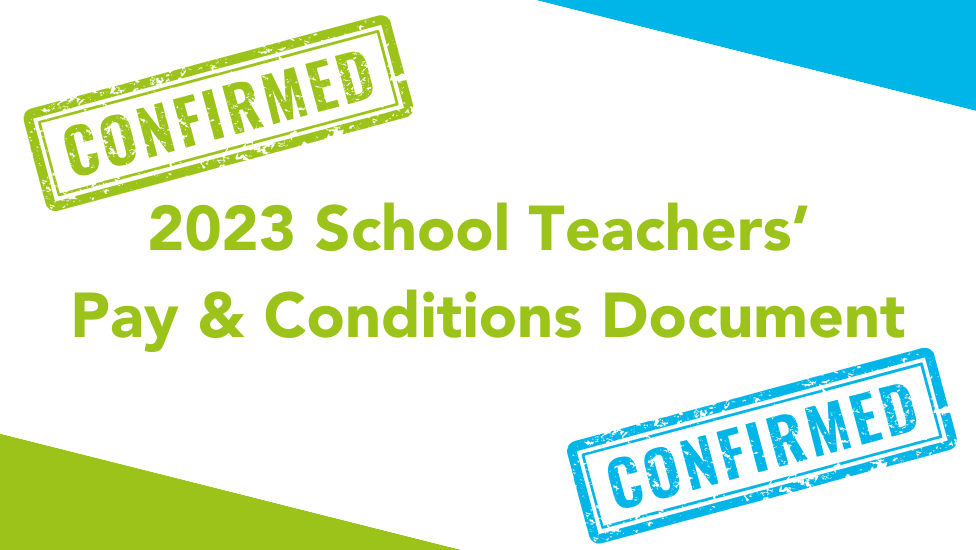
2023 School Teachers' Pay and Conditions Document (STPCD) Confirmed by DfE
The 2023 School Teachers’ Pay and Conditions Document (STPCD) has now been published by the DfE. HR Connect outline all the key updates, how to implement the changes, using the advisory pay points and a useful checklist for schools.

The 2023 School Teachers’ Pay and Conditions Document (STPCD) has now been published by the DfE. This includes confirmation of the new teaching pay range values which are applicable from 1st September 2023.
- A 6.5% - uplift to the minimum and maximum values of all the teaching and leadership pay ranges, advisory pay points and the minimum and maximum values for TLR and SEN allowances.
- A higher - uplift to the minimum of the main pay range to achieve the Government’s commitment of a £30,000 starting salary for new teachers in England and Wales.
There have been no other changes to teachers’ pay and conditions this year.
The new salary ranges for all teaching pay scales and advisory pay points can be viewed in Annex 3 and 4 of the STPCD Schoolteachers' pay and conditions - GOV.UK (www.gov.uk)
Implementing the Changes
The 2023 STPCD is not a legal document until 3rd November when the parliamentary process of finalising the legislation concluded. Whilst we are not expecting the Pay Order to change the published STPCD 2023, it could, and therefore Maintained Schools, for whom the STPCD is a statutory document, and Academies which follow STPCD terms should wait for this to be completed.
Schools and Academies should review their current pay policy and update the pay progression arrangements with the salary values for September 2023.
Schools are encouraged to undertake meaningful consultation with staff and unions at a local level about any revisions to a school’s pay policy
Where a teacher is paid on the minimum of their pay range, their salary must be uplifted to at least the new minimum regardless of performance. A further performance related pay increase may be payable depending on the provisions within the School’s pay policy.
Where a teacher is currently paid at the maximum of their range there is no automatic movement to the new maximum – they will only move to the new ceiling value subject to performance and evidence of meeting the criteria for pay progression within the School.
For all other teachers, the School must determine, based on evidence of performance and in accordance with the principles and framework set out in their own pay policy for 2022/23, the appropriate pay increase.
The use of STPCD Advisory Pay Points
Schools may wish to adopt the STPCD advisory pay points for main, upper and unqualified teachers. These are discretionary and Schools may continue to use points of different values or alternative non points-based approaches to pay progression.
The advisory pay points are designed to provide a framework to ensure appropriate salary differentials for teachers paid above the new £30,000 starting salary. The advisory points intentionally allow for steeper rates of pay progression for early career stage teachers. It is the Dfe’s intention that these changes will support teacher recruitment and retention.
Where a School wishes to adopt the new advisory points, they will need to assimilate teachers onto these. In assimilating, consideration will need to be given to ensuring that no teacher is at a detriment compared to what they might reasonably have been expected to receive under the School’s 2022/23 pay policy. Schools should also ensure meaningful and appropriate pay progression is awarded based on the teacher’s level of performance over the 2022/23 pay and appraisal cycle.
Where a School continues to use alternative models for pay progression – they will need to carefully consider how to allow for meaningful rates of pay progression for teachers paid above the minimum value.
There are no advisory pay points for leadership and leading practitioner pay ranges and Schools / Academies will need to continue to determine locally an appropriate framework for pay progression. Schools should note that the pay points for these ranges published within the joint union guidance are advisory and there is no obligation to follow these.
Assessing Performance
Pay Decisions for September 2023 should continue to be based on evidence of performance through the appraisal cycle for 2022/23. A review of performance should take place before any pay recommendation and decision is made.
Checklist of Actions for Schools
· Consider carefully how much is available in the budget for pay increases
· Complete the end of year appraisals and make pay recommendations/decisions where performance is meeting expectations
· Determine the pay uplift to be applied in line with the principles set out in the School’s pay policy
· Consider whether to assimilate to the STPCD advisory pay points
· Review and revise pay policy. Consult locally with teachers and unions on any changes before governors ratify the revised policy
· Provide teacher with a written pay statement and notify payroll provider.
Please also refer to our recent Teachers’ Pay Update webinar – for further guidance on the management of teachers pay. This can be viewed below:
HR Connect Customer Links
HR Connect customers can access additional resources at the links below:
Further Information
2023 School Teachers’ Pay and Conditions Document - https://www.gov.uk/government/publications/school-teachers-pay-and-conditions
Dfe Guidance – Implementing your School’s Approach to Pay: Schoolteachers’ pay and conditions: guidance - GOV.UK (www.gov.uk)



